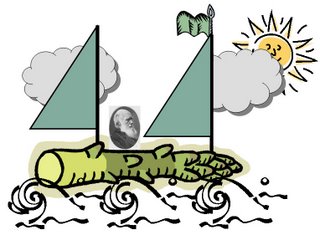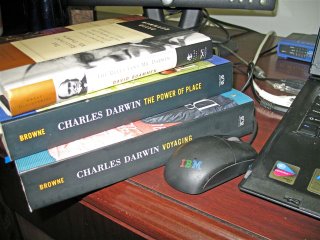Mr. Darwin had odd (but characteristically "Darwinian") views concerning the subject of marriage. Early on, speaking frankly with his Father, Dr. Darwin, Mr. Darwin asked should he opt for married life and poverty in London ("like a prisoner") or married life and poverty in Cambridge ("like a fish out of water")? Dr. Darwin assured his son that his inheritance would insure that Mr. Darwin was always confortably provided for (Browne "voyaging" p. 378) - Ah, good ol' Dad's money - who says you can't inherit happiness? With that "burden" lifted Mr. Darwin began looking at the question of marriage differently. True to his nature, he constructed the following document now titled "Marry" or "Not Marry"?:

Mr. Darwin divided the document vertically and titled one side "Marry" and the other side "Not Marry". Now I know that this picture is somewhat hard to read in its original format, so here is basically what each side says:
Marry
Children (if it Please God)
Constant companion (and friend in old age) who will feel interested in one
Object to be beloved and played with.
Better than a dog anyhow
Home, & someone to take care of house
Charms of music and female chit-chat
These things good for one’s health—but terrible loss of time
My God, it is intolerable to think of spending one’s whole life, like a neuter bee, working, working, and nothing after all—No, no, won’t do
Imagine living all one’s day solitary in smoky dirty London House
Only picture to yourself a nice soft wife on a sofa with good fire and books and music perhaps
Compare this vision with the dingy reality of Great Marlboro Street, London
Not Marry
Freedom to go where one liked
Choice of Society and little of it
Conversation of clever men at clubs
Not forced to visit relatives and bend in every trifle
Expense and anxiety of children
Perhaps quarrelling
Loss of Time
Cannot read in the evenings
Fatness and idleness
Anxiety and responsibility
Less money for books etc.
If many children forced to gain one’s bread (But then it is very bad for one’s health to work too much)
Perhaps my wife won’t like London; then the sentence is banishment and degradation into indolent, idle fool
************
Darwin was twenty-nine when he wrote this, and had been living, presumably in grand bachelor style, in London for almost two years. His five-year voyage on the HMS Beagle was done, and both his age and status brought marriage to mind. Clearly Mr. Darwin was facing the same dilemma that many folks face even today - career? / family?
O.K., so if Mr. Darwin were to marry, the question then becomes "Who to marry?" All this bar-hopping, dating, flowers, meeting the parents and long moon-lit strolls just WERE NOT Mr. Darwin's style - all this romantic love crap were not necessary and he didn't have the time or the prediliction for such nonsense. So how does Mr. Darwin solve this problem?
Well, he marches straight over to his first cousin's place (the Wedgwood's - who made a butt load of money of their own making pottery) and visits the youngest of those cousins, Emma Wedgwood. Mr. Darwin sticks around for about three days making small talk (no proposal) and then promptly turns around and heads back to London (he had lots of work to do and bigger fish to fry there!). Oh yes, here's what "Dear merry little Emma" looks like:

Emma is about one year older than Mr. Darwin and just about the only Wedgwood cousin left that was "marriage-able." About three or four months later in November (after he's done frying bigger fish in London), Mr. Darwin heads back to Maer Hall (the Wedgwoods house), immediately proposes to Emma and is "stunned" when she accepts - what the hell does he do now? Both Mr. Darwin and Emma were "underwhelmed" by the situation and carried on just as normal. Mr. Darwin took off for Shrewsbury (his Dad's house) to ask his permission to marry - a social detail - and the match was immediately accepted. A match of "great convenience" for everyone concerned. The fortunes (considerable) of both families stayed "in the family", and Mr. Darwin had a wife "better than a dog anyhow."
Well, they were married on 29 January 1839 - no honeymoon, no huffery and puffery - straight back to London. Even though this account sounds cold and loveless, their love and respect grew. Emma Darwin was Mr. Darwin's only lover, friend, cheerleader, nurse, confidant and keeper until his death on April 19, 1882. I'd say he chose wisely.





